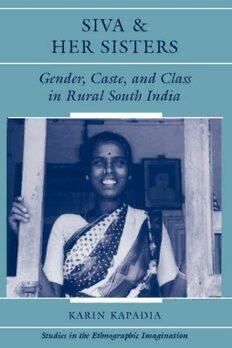
Siva And Her Sisters: Gender, Caste, And Class In Rural South India PDF
292 Pages·1998·45.797 MB·English
Most books are stored in the elastic cloud where traffic is expensive. For this reason, we have a limit on daily download.
Preview Siva And Her Sisters: Gender, Caste, And Class In Rural South India
Description:
This book examines two subordinated groupsuntouchables” and womenin a village in Tamilnadu, South India. The lives and work of untouchable” women in this village provide a unique analytical focus that clarifies the ways in which three axes of identitygender, caste, and classare constructed in South India. Karin Kapadia argues that subordinated groups do not internalize the values of their masters but instead reject them in innumerable subtle ways.Kapadia contends that elites who hold economic power do not dominate the symbolic means of production. Looking at the everyday practices, rituals, and cultural discourses of Tamil low castes, she shows how their cultural values repudiate the norms of Brahminical elites. She also demonstrates that caste and class processes cannot be fully addressed without considering their interrelationship with gender.
See more
The list of books you might like
Most books are stored in the elastic cloud where traffic is expensive. For this reason, we have a limit on daily download.
